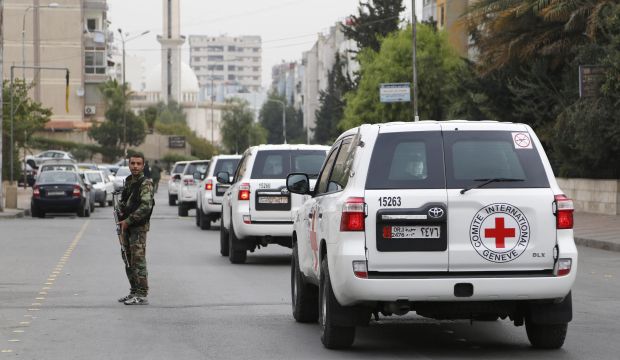
A convoy carrying Peter Maurer, president of the ICRC, drives past a member of forces loyal to Syria’s President Bashar Al-Assad securing the road in the Damascus suburb of Barzeh on November 14, 2014. (Reuters/Omar Sanadiki)
Beirut, Asharq Al-Awsat—Several Syrian opposition activists in Damascus have accused the International Red Cross of ignoring the plight of Syrians in opposition-held areas while delivering aid to neighborhoods controlled by the Syrian regime.
Activists in the Barzeh neighborhood in northern Damascus tweeted that three recent humanitarian operations by the Red Cross in the neighborhood had focused exclusively on an area known for being loyal to Syrian President Bashar Al-Assad.
The activists described the area on their Twitter accounts as a “storehouse” for the regime’s notorious shabiha militias, and pointed to a photograph posted on the International Red Cross’s official Facebook page showing a picture of the organization’s president, Peter Maurer, personally delivering aid to people in the area, with a picture of Assad behind him on a wall.
Speaking to Asharq Al-Awsat, Simon Schorno, spokesman for the Red Cross in Syria, denied the allegations, insisting that the organization’s motives were entirely humanitarian and were part of its overall efforts in Syria to provide humanitarian aid.
Meanwhile, an opposition source in the Rif Dimashq suburb just outside Damascus made similar accusations toward other international NGOs currently working in the country.
The source told Asharq Al-Awsat that the Ghouta area just east of Damascus was suffering from an “almost total lack” of humanitarian aid from NGOs, and that when these organizations did attempt to get aid in, it was “completely blocked” by Syrian government forces patrolling the entry points to the area.
Because of the lack of assistance in the area, the source said, prices of ordinary food products and provisions were rising to “insane levels.”
Meanwhile, sources in the eastern city of Homs—previously an opposition stronghold but now almost completely controlled by government forces—told a similar story.
In Al-Wa’ar, the only part of the city still under the control of the opposition, the humanitarian situation is dire, according to Abdul Ilah Fahad, a member of the main opposition bloc, the Syrian National Coalition.
Fahad told Asharq Al-Awsat that the area had suffered a 90-day embargo by government forces, who had only allowed vegetables in, he said that residents had to purchase the produce at “astronomical” prices.
The council member said the situation had improved last week following the arrival of 28 vehicles carrying humanitarian aid, though he added that the aid was still “not enough” to supply the area’s 190,000 residents.
Fahad said the arrival of the aid came following “direct contact we [the Coalition] made with the office of the UN secretary-general [Ban Ki-moon] . . . asking for [his] intervention,” and the brokering of an agreement with the Syrian government to allow the aid to enter the area during a six-day ceasefire.
He added that the ceasefire was still in effect and that bombardment of the area by government forces had indeed abated, though not entirely stopped.
Al-Wa’ar was among the areas which the Syrian government agreed to allow aid into as part of the Geneva II accords. The government did adhere to the agreement for two months, but following its retaking of the Old City in Homs—one of the last opposition strongholds in the city—aid was prevented from reaching the area, which was then totally surrounded by government forces.

Trackbacks/Pingbacks